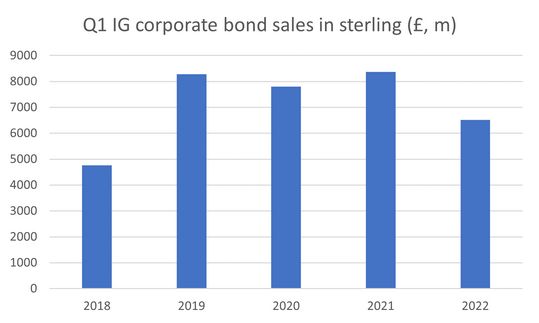Enel kicked off second-quarter sterling bond sales in the high-grade corporate market on Monday after a sluggish start to the year in the currency, with quarterly sales posting the lowest volume since 2019.
The Italian utility (Baa1/BBB+/BBB+) raised £750m from a seven-year sustainability-linked bond that gained demand of more than £1.9bn at guidance after leaving around 10bp concessions on the table.
"We saw Enel's IPTs starting 30bp back of fair value," said a syndicate banker before the deal was launched. "It's a repeat borrower in SLB and doesn't issue that often in sterling, so will go okay."
The bonds landed at mid-Gilts plus 140bp, inside initial price thoughts of plus 160bp area, via BNP Paribas, Credit Agricole, Goldman Sachs, HSBC, JP Morgan, Santander, Societe Generale, SMBC Nikko and UniCredit.
Comparables included the company's existing SLB due October 2027 and a conventional portion due June 2037 that were bid at 112bp and 150bp, respectively.
The non-UK issuer previously tapped the sterling bond market with a debut SLB transaction for the currency in October 2020. It raised €2.75bn from a three-part sustainability-linked bond offering on January 10.
The trade offers sterling investors a quality euro utility name, wrote CreditSights analysts, who saw fair value at around 120bp–125bp and looked to receive concessions of 10bp–15bp. The analysts expect Enel to be active in the UK wind market given the EU push into renewables and with the country expected to announce increased targets for both offshore and onshore wind. The company does not yet have a significant business in the UK, however.
There is a 25bp coupon step-up linked to the company's greenhouse gas emissions target.

Source: IFR
Enel's offering comes as investment-grade corporate bond sales in sterling dropped 22% in the first quarter this year from the same period last year to £6.51bn, according to IFR data. That figure is the lowest since the first quarter of 2019, when sterling bond sales came in at £8.28bn, but still higher than £4.76bn during the same quarter in 2018.
For some investors, the sterling market has not been cheap enough compared to euros to reap a profit from the price difference.
"If sterling bonds are cheaper, we can sell euros and buy sterling, but the dislocation was not big enough," said a portfolio manager. "Also, sterling is not liquid, so selling the bonds in sterling after they have performed is not easy, so we need a meaningfully higher spread to do that trade."
The iBoxx sterling non-financials senior index tightened to asset swaps plus 164bp on Friday, well inside the peak of around 179bp touched in early March but also well back from the 124bp level at the start of the year. This compares with the 83bp spread seen on Friday for euro non-financial seniors and 55bp at the start of the year.